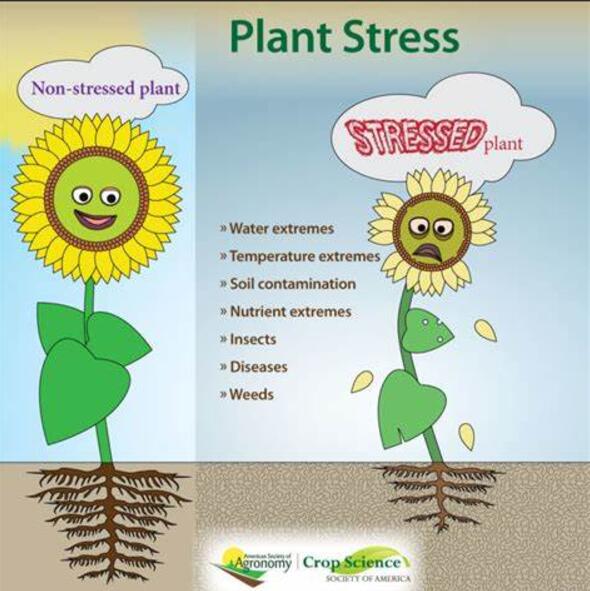生物制剂对春大麦干旱适应的基因型依赖效应
IF 6.8
Q1 PLANT SCIENCES
引用次数: 0
摘要
频繁的干旱给全球农业带来了重大挑战。鉴于干旱胁迫的全球重要性,正在讨论使用植物生物生长剂(以下简称“生物制剂”)作为提高植物耐旱性的一种潜在方法。然而,目前支持生物制剂积极作用的经验证据有限,其作用方式在很大程度上仍是未知的。本研究对18种生物制剂对两种春大麦基因型早期抗旱性的影响进行了试验。与未处理对照相比,8种生物制剂(Alginure、ASL Kombi Power、CropCover、ErosionControl、Burdock、Giant knotweed、FytoSafe和Bioplantol mycos V forte)在早期干旱胁迫下对一个基因型的6个性状和另一个基因型的7个性状表现出积极影响。选择4种生物制剂进行10个基因型的温室和田间验证试验。因此,干旱胁迫下的粮食生物量显著(P <;0.05),两种条件下均增加了生物虎杖的生长。该研究为生物制剂的基因型特异性效应提供了有价值的见解,并为管理干旱胁迫提供了潜在的策略。此外,该结果还有助于更好地理解生物制剂对大麦非生物胁迫的作用和机制。本文章由计算机程序翻译,如有差异,请以英文原文为准。
The genotype-dependent effects of biologicals on drought adaptation in spring barley
Frequent periods of drought stress are causing significant challenges for agriculture worldwide. Given the global importance of drought stress, the use of biological plant growth agents (hereinafter referred to as “biologicals”) is being discussed as a potential approach to enhance the drought tolerance of plants. However, there is currently limited empirical evidence supporting positive effects of biologicals, and their mode of action is still largely unknown. In this study, eighteen biologicals were tested for their effects on early drought stress tolerance in two spring barley genotypes. Eight biologicals (Alginure, ASL Kombi Power, CropCover, ErosionControl, Burdock, Giant knotweed, FytoSafe, and Bioplantol mycos V forte) showed positive effects on six traits in one genotype and on seven traits in another genotype under early drought stress compared to the untreated control. Four biologicals were selected for validation trials with ten genotypes in greenhouse and field experiments. Thereby, grain biomass under drought stress was significantly (P < 0.05) increased by the biological Giant knotweed under both conditions. This study provides valuable insights into the genotype specific effects of biologicals and introduces a potential strategy for managing drought stress. Moreover, the results offer a better understanding of the effects and mechanisms of biologicals on abiotic stress in barley.
求助全文
通过发布文献求助,成功后即可免费获取论文全文。
去求助
来源期刊

Plant Stress
PLANT SCIENCES-
CiteScore
5.20
自引率
8.00%
发文量
76
审稿时长
63 days
期刊介绍:
The journal Plant Stress deals with plant (or other photoautotrophs, such as algae, cyanobacteria and lichens) responses to abiotic and biotic stress factors that can result in limited growth and productivity. Such responses can be analyzed and described at a physiological, biochemical and molecular level. Experimental approaches/technologies aiming to improve growth and productivity with a potential for downstream validation under stress conditions will also be considered. Both fundamental and applied research manuscripts are welcome, provided that clear mechanistic hypotheses are made and descriptive approaches are avoided. In addition, high-quality review articles will also be considered, provided they follow a critical approach and stimulate thought for future research avenues.
Plant Stress welcomes high-quality manuscripts related (but not limited) to interactions between plants and:
Lack of water (drought) and excess (flooding),
Salinity stress,
Elevated temperature and/or low temperature (chilling and freezing),
Hypoxia and/or anoxia,
Mineral nutrient excess and/or deficiency,
Heavy metals and/or metalloids,
Plant priming (chemical, biological, physiological, nanomaterial, biostimulant) approaches for improved stress protection,
Viral, phytoplasma, bacterial and fungal plant-pathogen interactions.
The journal welcomes basic and applied research articles, as well as review articles and short communications. All submitted manuscripts will be subject to a thorough peer-reviewing process.
 求助内容:
求助内容: 应助结果提醒方式:
应助结果提醒方式:


